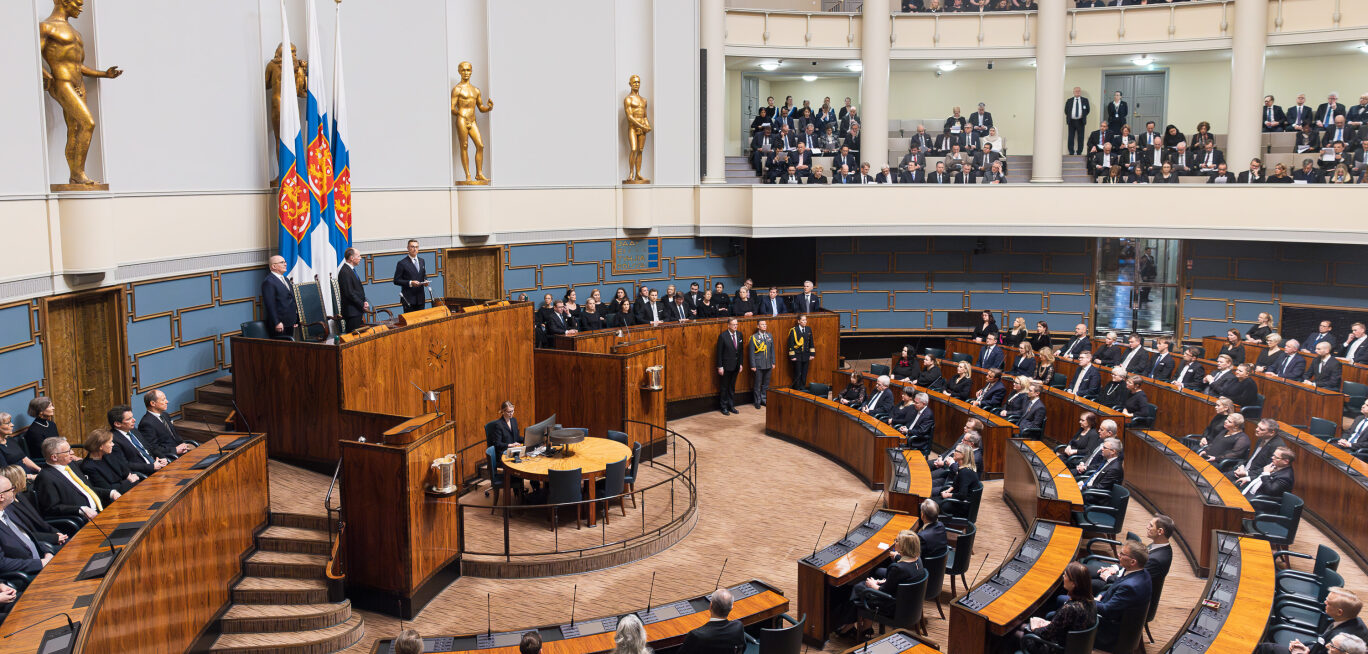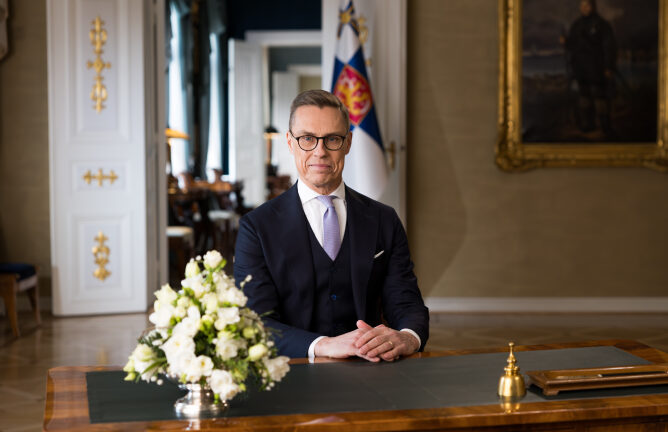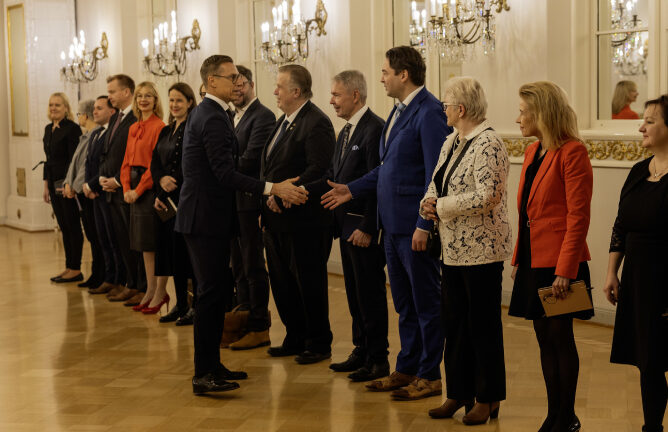Mr Speaker, Honoured representatives of the Finnish nation,
Over the past year, I have often returned to your speech at my inauguration. It contains many wise thoughts that I have tried to apply in my daily work. Unfortunately, I have fallen short in one respect: I did not read one book a week. Nor have I reread Machiavelli. Looking at the world around us, maybe I should.
I have done my best to promote Finland’s national interest in every situation and always in cooperation with the Government and Parliament. Today, this is more important than ever since the end of the Cold War. In difficult times, we Finns must always stand together.
We are entering a new world. Many things we used to consider normal will change, or have already changed Both the global environment and Finland’s positioning in it are changing, and we must learn to operate in this new environment.
So how can we best promote Finland’s interests in this transition? This is something we should reflect on, at least through the content of our foreign policy, our democratic institutions and the responsibility of the individual.
Honourable Members of Parliament,
The rules-based system is being challenged by power politics. Bilateralism and transactions have entered the arena alongside multilateral cooperation. We often associate a transactional approach with Russia and China. But the same features apply to some Western powers as well.
In my inauguration speech, I said that we will be facing things we are not used to. I called on people to be prepared for the fact that sometimes we will have to react swiftly to changing circumstances. We will face many difficult questions of principle. Honourable Members of Parliament, you have shown that you are able to react quickly to difficult situations.
Together, we have defined value-based realism as the guiding principle of the Government Report on Finnish Foreign and Security Policy. The aim is to help Finland find its way in this difficult global political transition.
In the long term, it is in Finland’s best interest that the multilateral system remains as strong as possible. But we cannot exclude ourselves from decision-making that takes place partly outside this system. Nor can we isolate ourselves from countries that do not fully support multilateralism. We will promote our interests in all situations, based on our own values.
However, the world is not black and white. Western countries are increasingly making ad hoc rather than ideological choices in their foreign policy. It is not a question of whether we have rules or not, but of the direction in which the system of rules is evolving. In addition to the West, we also have a many partners globally with whom we can further develop the international rule-based system.
We will always put Finland’s interests and security first. Our foreign policy is built together with our allies in the Nordic countries, the EU and NATO. At present, as so often in the past, the actions of Russia and the United States have a key impact on our foreign and security policy, not forgetting China.
Russia’s illegal war of aggression in Ukraine has been going on for almost three years. Ukraine’s cause is ours. In the short term, we must continue our economic, political and military support for Ukraine. n the medium term, we must find a peace solution that respects Ukraine’s independence, sovereignty and territorial integrity. In the long term, we will help rebuild Ukraine and help Ukraine join the EU and NATO.
In foreign policy, recognising the facts is the beginning of wisdom. The foreign policy of our close ally, the United States, currently relies more on transactions than on multilateralism. This is a challenge for Finland and Europe. It is clear that we will continue to uphold the values that are important to us, such as democracy, the rule of law, international law and institutions and human rights.
However, global challenges demand close cooperation between Europe and the United States. Without compromising on its principles, Europe must bring opportunities for cooperation to the table.
We have rapidly established our position in NATO. However, the Alliance is also affected by the changing security environment and it, too, is in a state of transition. Threats require new capabilities and capabilities require greater resources. Entrusted with the exercise of the budgetary power, you have a great responsibility. Further investments in defence require broad consensus.
We live in an era of unrest. In recent years, Finland has experienced a wide range of hybrid influencing: cyberattacks, instrumentalised migration, information influence activities and damage to our critical physical infrastructure. In all these situations, it is important that we Finns keep our cool. Our preparedness and security of supply are first class.
Honourable Members of Parliament,
The Finnish system of foreign policy governance, consisting of the President of the Republic and the Government, responds well to the present needs. The main duties of the President are related to Finland’s foreign policy and the position as Supreme Commander of the Finnish Defence Forces. The changing global political landscape underlines the importance of extensive international networks. At the same time, our security environment demands the ability to respond to both military threats and other hostile operations.
Even when led by someone, foreign policy is a team sport. As President, my work is based on preparation by and cooperation with the Government. It is our common task to promote Finland’s interests and security. I would like to thank the Government for its excellent cooperation. It has worked seamlessly, in both directions. This is what team sports are about.
The main objective of the Constitution of Finland is to bring stability and continuity to the constitutional principles. I consider it important that we respect the separation of the governmental powers provided for in our Constitution. For the President of the Republic, the Constitution is not a matter of opinion, but a cornerstone of democracy and competence. Our current system works well and the Finnish people are happy with it. I am committed to respecting the Constitution in all my activities.
As we all know, the Government has to provide Parliament with all the information it needs in the consideration of matters. Communication between the President and Parliament is a complement to this. In practice, however, this contact is very important to maintain a shared situational awareness. This strengthens unity and trust.
In my inauguration speech, I promised to stay in close contact with Parliament and its committees. During my first eleven months in office, I have met all the parliamentary groups. I have also met with four different committees ten times in total. In addition, we have also held meetings with the chairs of the parliamentary parties. Naturally, the closest contacts have been with the Foreign Affairs Committee and the Defence Committee.
I hold our open dialogue in high esteem. In my discussions with you, honourable Members of Parliament, I have felt that there is a mutual appreciation of the openness of cooperation. I hope that we can continue our close communication in the future.
The Chancellor of Justice has paid attention to the fact that Parliament’s access to information depends, among other things, on the persons in power at any given the time. Of course, the influence of individuals cannot be completely eliminated. Nor can mutual trust be imposed by any regulation. But practices that support common goals are a good basis for cooperation.
For my part, I am ready to support the recording of best practices in informal communication between the President and Parliament. The President cannot bypass or replace the Government, which is responsible for providing Parliament with information. Nevertheless, I believe that the current good practices between the President and Parliament could be confirmed.
The Chancellor of Justice has also stated that it is not possible or meaningful to regulate the highest state bodies in detail. He summarises the reasoning aptly: “Regulation must enable flexible decision-making and the necessary strength of governmental authority for a small state, even in a turbulent international environment.”
Unfortunately, conditions are indeed turbulent at the moment. The difficult security situation underlines the need for unity. It requires ability to engage in confidential discussions and to react quickly and decisively. Our system meets these needs excellently.
Ultimately, our security is built on the fact that our democratic system is underpinned by competent authorities. Having had the opportunity to see how our authorities work, I can say that I sleep peacefully at night.
Honourable Members of Parliament,
Institutions are for people, not the other way around. But no system will work if individuals do not take responsibility.
We live in an age where technology is shaping our behaviour more than we ever imagined. In previous decades, we used to think that technological progress would bring us limitless possibilities and make individuals and communities smarter.
Well, it did not work out quite that way. The ever-increasing amount of information and the world of algorithms challenge us on many levels. The abundance of information does not correlate with wisdom. The enormous amount of stimuli and input is blocking our minds. It becomes increasingly difficult to discern what is important. Modern technology, such as artificial intelligence, is not only an instrument, but also an actor.
Democracy is still not adapted to the era of new technology. Especially as social media platforms seem to favour confrontation over constructive debate.
Every decision-maker needs to consider how they act on social media platforms. Are they using our diverse communication channels to spread anger and uncertainty or to generate hope?
As Members of Parliament, you have a great responsibility. Your actions influence the atmosphere of discussion in Finland and set an example for young people in particular.
Democracy means allowing different views and opinions. And an open debate. But instead of a black and white, personalised social debate, I hope to see a more respectful, constructive one. The importance of dignified and respectful behaviour is particularly emphasised here in Parliament, especially when you, as decision-makers, have difficult issues to resolve.
Honoured Members of Parliament, Mr Speaker,
Today we celebrate Runeberg Day.
“However fate may cast our lot a land, a fatherland, we’ve got. Will there a thing on earth appear, more worthy, to hold dear?”
With this passage from J. L. Runeberg’s poem “Our Land”, I would like to thank the entire Parliament and you, Mr Speaker, for your excellent cooperation during my first year in office. We all work for Finland, together.
I congratulate the Speakers for the support you have received. I wish you all strength and wisdom in your demanding tasks. I declare the 2025 Parliament open.
Thank you.


